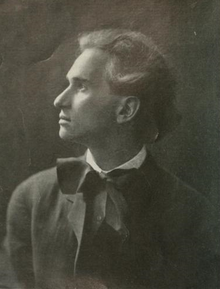Edward Earle Purinton | |
|---|---|
 | |
| Born | April 24, 1878 |
| Died | July 10, 1943[1] |
| Occupation(s) | Businessman, writer |
Edward Earle Purinton (April 24, 1878 – July 10, 1943) was an American businessman, naturopath, philosopher and self-help writer.
Biography[edit]
Purinton was born in Morgantown, West Virginia. He obtained his Bachelor of Arts from Denison University in June 1899 and was an instructor in Greek at the Doane Academy (1899–1900).[2] His father was Daniel Boardman Purinton, a former President of Denison University.[3]
Purinton wrote articles on business and personal efficiency for The Independent magazine. He was Director of The Independent's Efficiency Service.[4] Purinton was dean of the American Efficiency Foundation and wrote about the virtues of American business practices.[5][6] He was a member of the American Academy of Political and Social Science and President of the National Efficiency League of New York City.[7]
Purinton was a naturopath.[8][9] In 1902, Purinton edited Benedict Lust's The Naturopath and Herald of Health.[9] He was a notable advocate of fasting, authoring The Philosophy of Fasting in 1915.[10] He labelled his system of fasting the "Conquest Fast" and described it as "a combination of the early Church Fast with the modern Therapeutic Fast."[11] His views on fasting influenced Wincenty Lutosławski.[8] Purinton recommended fasting for spiritual well-being and virtue.[12]
Purinton died at Chattahoochee, Florida.[1]
Selected publications[edit]
- The Soul in Silhouette (1904)
- The Philosophy of Fasting (1906)
- Efficient Living (1915)
- The Triumph of the Man Who Acts (1916)
- Personal Efficiency in Business (1920)
References[edit]
- ^ a b Anonymous. (1947). Edward Earle Purinton. Magazine of Sigma Chi 66 (6): 92.
- ^ Anonymous. (1900). The Sixty-Ninth Annual Catalogue of Denison University. Granville, Ohio: The University Press. p. 63, p. 275
- ^ Anonymous. (1903). Men of West Virginia. Biographical Publishing Company. pp. 94–95
- ^ Anonymous. (1915). How Efficient Are You?. Good Health 50 (12): 12.
- ^ Breen, T. H. (1996). The Power of Words: Documents in American History: From 1865. Talman Company. p. 129
- ^ "Big Ideas from Big Business". Oxford University Press.
- ^ Youngblood, Dorothy Mae. (1947). Speech in High School Education. University of Wisconsin–Madison. p. 12
- ^ a b Świerzowska, Agata. (2015). Esoteric Influences in Wincenty Lutosławski's Programme of National Improvement. Prolegomena. The Polish Journal of the Arts and Culture 13 (1): 147–172.
- ^ a b Cayleff, Susan E. (2016). Nature's Path: A History of Naturopathic Healing in America. Hopkins University Press. pp. 211–212. ISBN 978-1-4214-1903-9
- ^ Anonymous. (1906). Book Review: The Philosophy of Fasting The Journal of the American Osteopathic Association 5: 425.
- ^ Griffith, R. Marie. (2004). Born Again Bodies: Flesh and Spirit in American Christianity. University of California Press. p. 124. ISBN 0-520-21753-5
- ^ Griffith, R. Marie. (2000). Apostles of Abstinence: Fasting and Masculinity during the Progressive Era. American Quarterly 52 (4): 599–638.
External links[edit]
- Edward Earle Purinton – Online Books